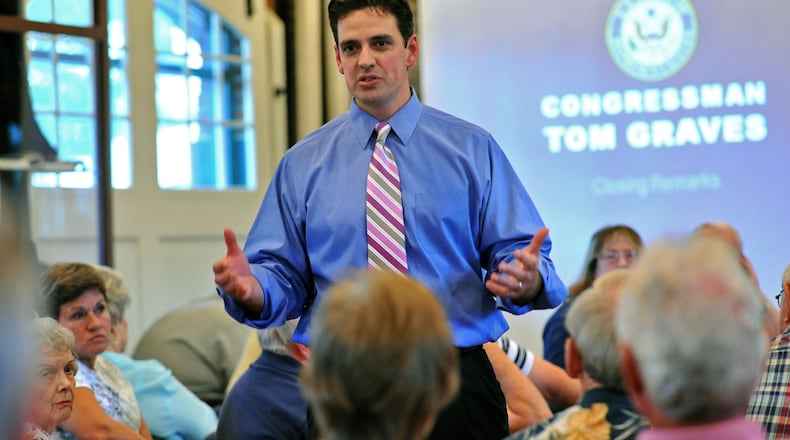The weeks leading up to the October 2013 government shutdown proved to be pivotal ones in the career trajectory of Georgia Congressman Tom Graves.
The Ranger Republican and a band of upstart young conservatives had scored a major political victory after they orchestrated a behind-the-scenes GOP revolt over Obamacare. They managed to push then-Speaker John Boehner and his lieutenants into supporting their gambit of withholding needed government funding in exchange for blocking the implementation of the health law before it could go into effect.
The maneuver was risky, and it ultimately proved to be unsuccessful for the party. It also instantly pinned Graves, one of the plan’s main House architects, with a proverbial scarlet letter: the label of conservative firebrand.
Flash-forward four years and Graves, 47, has come full circle.
Now the senior-most Republican in the Georgia delegation, Graves has substantially revised his methods since the 16-day shutdown. He’s no longer the bomb thrower he was. Instead, he’s taken a tack toward the pragmatic.
He’s patched things up with party leaders. These days he’s a senior vote counter and in charge of funding large federal agencies as a senior member of the Appropriations Committee, assignments that have put him in the position of advocating to keep the government operating smoothly. Graves’ brainchild, a 12-in-1 spending package, will be one of the House’s first items of business on the floor this week.
“I would say I was probably pretty impatient at one point in my life,” Graves said “Still I’m impatient at times, but I learned patience is required to see something through to the end.”
Graves’ political rebirth has helped him amass power on Capitol Hill and become one of the most powerful players in the Georgia delegation. But it’s also alienated some of the conservative activists who helped Graves first get elected to Congress in 2010.
“I think he’s just fallen in love with the marble inside the Capitol,” said Jason Pye, a GOP activist in Georgia who also works as vice president of legislative affairs for the right-leaning grass-roots group FreedomWorks.
Leadership friend or foe?
Graves has spent his political career bouncing between insider and outsider status.
A real estate investor who came from humble roots outside of Cartersville, Graves was elected to the Georgia House at age 32.
He started out close with Republican leaders there, but he then fell out, creating the 216 Policy Group of independent conservatives that adhered to the orthodoxy of supply-side Reaganomics and was often a thorn in the side of Georgia House Speaker Glenn Richardson.
Graves eventually aligned himself with the then-fledgling tea party movement, an alliance that helped bolster his 2010 bid to succeed Nathan Deal in a deeply conservative U.S. House district in northwest Georgia.
After he arrived on Capitol Hill, Graves careened between leadership under Boehner and the House’s conservative outsiders.
He was given the boot on the vote-counting whip team for opposing leadership-sanctioned spending bills. He next delved into work with the Republican Study Committee, a group of some of the House's most conservative members, and he was being groomed to become its leader until he was outmaneuvered by Louisiana Republican Steve Scalise.
Then came the shutdown showdown of 2013.
Graves was one of the most vocal proponents of embarking on an all-out war against the Affordable Care Act. Enrollment in state-based insurance exchanges was set to begin for the first time that October, on the same date that the government needed fresh funding in order to keep its doors open.
Republican leaders in control of the House had been pushing for a politically safer route that would have shielded their members from the risk of a shutdown.
Graves was livid. He authored an alternative plan that would have funded the government but also postponed implementation of Obamacare for a year. As the proposal gained steam from conservative groups and dozens of colleagues, GOP leaders were all but forced to give in and tee up a vote.
"This isn't about the president, it's about this law and the American people. That's why we're willing to do what we can to protect everyone from it, as well as keeping the government operating," Graves told The Washington Post at the time.
The law Graves fought now provides health insurance to roughly a half-million Georgians.
Changing style
Graves’ strategy didn’t work. After two weeks of brutal PR, Republican leaders cut a deal with Senate Democrats and President Barack Obama to reopen the government without any concessions on health care.
That marked a major turning point for Graves.
He put his head down and dove back into his work on the Appropriations Committee. A little more than a year after the shutdown, he was promoted to lead a small subcommittee in charge of funding maintenance of the Capitol grounds. Two years later, he earned a bigger prize: the House purse strings of the Internal Revenue Service, the Securities and Exchange Commission and other financial agencies.
“I’m sure I’m not anyone’s favorite because I have my own unique style,” Graves said of his colleagues on the committee. “But hopefully I’ve learned to respect other people’s opinions and work with them a little bit more. There’s no better way to make changes in any organization than from within. It’s slow. It takes trust.”
He also won the confidence of Kevin McCarthy, now the House's No. 2 Republican, who kicked Graves off the whip team in 2011 but let him rejoin two years later. McCarthy even tapped Graves to formally nominate him to be majority leader in June 2014, a sign of how far their relationship had progressed.
Throughout it all, Graves has long been rumored to be eyeing a run for statewide office. But a lawsuit over a defaulted loan he received with former state Senate Majority Leader Chip Rogers has cast a political shadow. Graves has denied any wrongdoing.
Top committees
Graves’ work building bridges has seemingly begun paying off.
He was given a spot on the plum House panel that doles out committee assignments, a position that has earned him kingmaker status among Republicans in Georgia and beyond seeking to build influence. He’s moved to take the mentor role Lynn Westmoreland long occupied within the Georgia delegation.
And it was Graves' relationship with McCarthy that helped Georgia lawmakers strip out at the eleventh hour language inserted into a federal spending bill in late 2015 that could have hurt the state's position in its long-running water war with Alabama and Florida. In exchange, Graves exacted promises from most members of the Georgia delegation to vote to pass the spending bill.
But his role on a committee tasked with spending money is among the reasons why some right-leaning groups say they aren’t thrilled with Graves anymore. Some critics say he’s gotten too used to spending money the federal government doesn’t have.
“Tom works for the favor factory,” said FreedomWorks’ Pye. “He is an appropriator. He’s part of the D.C. swamp, as much as I hate to say that about Tom. I like him as a person.”
FreedomWorks was an early backer of Graves as he ran for Deal’s old seat in the summer of 2010, as was the Atlanta Tea Party Patriots.
Graves has been a “tremendous disappointment” since then, said Debbie Dooley of the Tea Party Patriots. She cited his votes for various GOP budgets and, in her mind, insufficiently conservative parts of House leadership’s agenda.
“He was very much a tea party guy, and then, basically, he began drinking the Potomac Kool-Aid,” she said. “If I had to do it over again, I would not have endorsed him.”
Government spending
Graves disagrees with that assessment. He said he’s used his position on the Appropriations Committee to steer the panel toward fiscal responsibility.
“I came on as a new breed of an appropriator, and that was one who was going to save taxpayer money versus spend it, and we’ve accomplished that,” he said. “It’s clear in the bills that I’ve passed and put together there’s reductions in spending, there’s cuts over time, eliminations of agencies and various non-essential programs.”
In the financial services-related spending bill he authored earlier this summer, Graves proposed giving Congress more direct control over the Consumer Financial Protection Bureau, an Obama-era watchdog agency that’s deeply unpopular with conservatives, and repealing various aspects of the Dodd-Frank financial regulatory overhaul.
“He has tremendous discipline,” U.S. Rep. Austin Scott, R-Tifton, said of his colleague since their days in the Georgia Legislature. “I think that’s what has made him effective. I think it’s his discipline more than style that has helped him reach the next level.”
On deck for Graves is his unorthodox 12-in-1 spending bill, which the House is slated to take up as soon as Wednesday.
Congress typically considers appropriations measures one by one, usually combining them only at the end of the year for bicameral wrap-up work.
Graves’ plan, dubbed the Make America Secure and Prosperous Appropriations Act, would merge all 12 individual spending bills right out of the gate. The goal is to establish a stronger negotiating position for the House GOP before it begins brokering end-of-year agreements with the Senate.
“Let’s do it all at once,” Graves said, “and show everyone what we believe.”
About the Author
Keep Reading
The Latest
Featured



